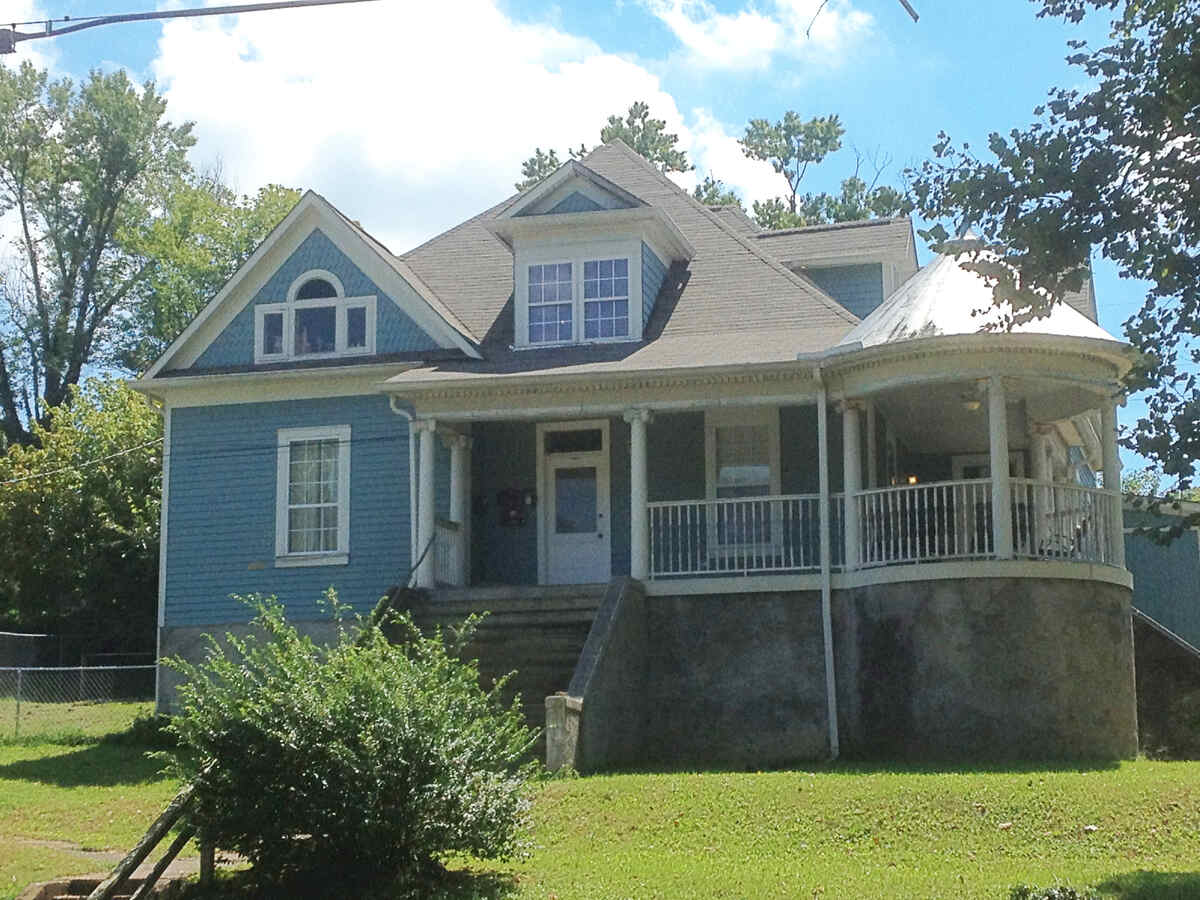
Tennessee, affectionately known as the Volunteer State, has got it all: lush rolling hills, spectacular views of the Blue Ridge Mountains, and endless opportunities to grow the best grass seed for Tennessee’s unique climate.
The key to successful lawn care in Tennessee is finding just the right type of grass seed to suit the state’s unpredictable “transition zone” weather. See our recommendations for the best Tennessee grass types here.
5 Grass Types That Will Make Your Tennessee Lawn Shine
From curb appeal to backyard barbecues, the right grass type can turn your Tennessee yard into something special.
Since Tennessee falls in the transition zone, both warm-season and cool-season grasses are capable of thriving here, giving you lots of options. With this in mind, here are five of the most popular grass types to plant in Tennessee.
1. Tall Fescue
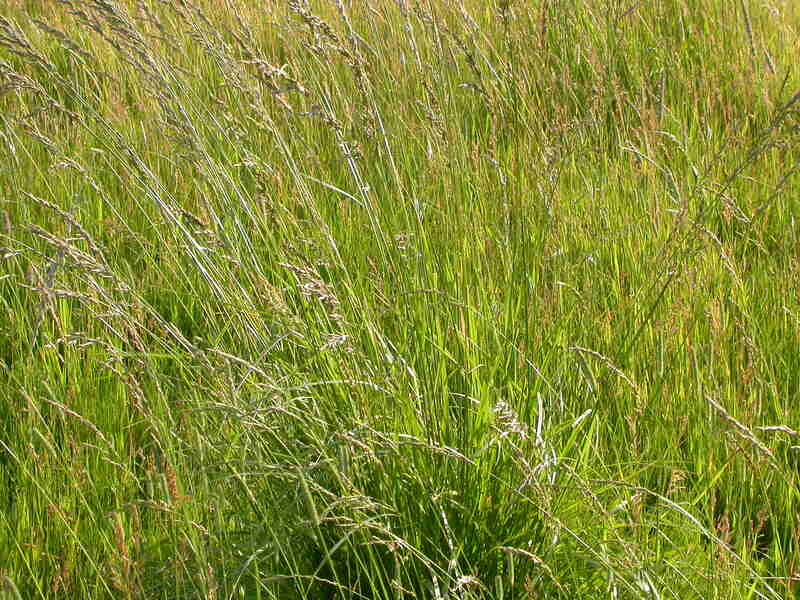
Photo Credit: Matt Lavin / Flickr / CC BY-SA 2.0
Originally from Europe, tall fescue is a popular cool-season grass in Tennessee. This medium to coarse-textured lawngrass can tolerate high temperatures, drought, and wear, making it a great grass for all seasons. It establishes quickly from seed and tolerates acidic soil, drought, and shade better than Kentucky bluegrass.
However, it has poor sod-forming characteristics with a bunchy growth habit, so you may need to overseed the lawn every few years to maintain thick turf. For a lush green look, opt for turf-type tall fescue grass varieties. They are typically higher in quality than the average Kentucky 31 variety and more resistant to disease.
- Classification: Cool-season grass
- Spreads by: Produces short rhizomes but has a bunch-type growth habit
- Shade tolerance: Moderate
- Drought tolerance: Moderate to High
- Foot traffic tolerance: Moderate
- Maintenance needs: Frequent mowing. Does not produce significant thatch.
- Mowing height: Set mowing height to 2 inches when the grass reaches 3 inches tall.
- Potential for disease: Tolerant of most diseases when properly maintained.
- Soil pH: 5.5-6.5
- Soil type: Adapted to a wide range of soil conditions, but prefers fertile clay soils with good drainage.
Grass Seed Options:
– Triple-Play Tall Fescue Grass Seed Blend (5000 sq ft)
– Eretz Kentucky 31 K31 Tall Fescue Grass Seed (choose your size)
– Pennington The Rebels Tall Fescue Grass Seed Mix (7 lb.)
2. Kentucky Bluegrass
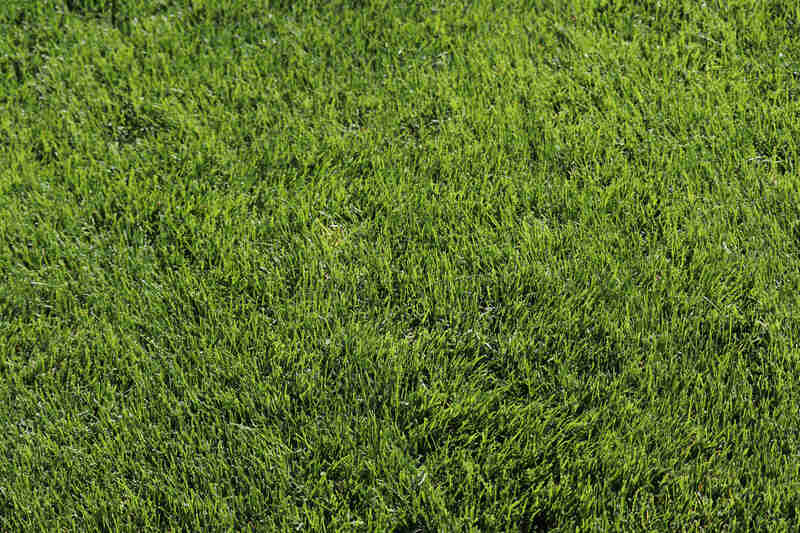
Photo Credit: Shutterstock
What’s more Tennessee than lush grass with a deep blueish-green tint? It’s no wonder Kentucky bluegrass, also known as KBG, is so popular with homeowners and landscapers alike. KBG has shallow roots, so it typically does better when blended with other types of grass seed for a more heat- and drought-resistant lawn.
It can take a while to establish from seed, so an alternative choice like perennial ryegrass is better for overseeding.
A bright, shade-less area is best for KBG, as it loves full sun and has strong rhizomes that can help with the tensile strength of sod. During Tennessee’s warmer months, one plant can produce from 20-50 feet of rhizomes in five months – which results in a thick, consistent turf.
- Classification: Cool-season grass
- Spreads by: Rhizomes
- Shade tolerance: Low
- Drought tolerance: Moderate
- Foot traffic tolerance: Moderate
- Maintenance needs: Moderate mowing frequency and high fertilization needs.
- Mowing height: Set mowing height between 2.5 and 3.5 inches.
- Potential for disease: Moderate to high; prone to several diseases, such as dollar spot, leaf spot, necrotic ring spot, summer patch, and stripe smut.
- Soil pH: 6.0-7.5
- Soil type: Performs best in well-drained, heavy soils with high fertility.
Grass Seed Options:
– Jonathan Green (11970) Blue Panther Kentucky Bluegrass Grass Seed (3 lbs.)
– SeedRanch Midnight Kentucky Bluegrass Seed (5 lbs.)
3. Bermudagrass

Photo Credit: rovenimages.com / Pexels
Bermudagrass is a popular warm-season grass found on golf courses and athletic fields across Middle Tennessee. This needy-yet-beautiful species needs plenty of sunshine to thrive, but if you can provide that, it’ll produce a dense turf capable of withstanding high traffic. It’s ideal for much-used backyards and can handle Tennessee’s hot summers.
But be prepared for the maintenance schedule – Bermudagrass will need monthly fertilization during the summer and frequent irrigation and mowing more than once per week. Spring is the best time to plant this fast-growing grass so it can grow deep roots before the hottest summer months.
- Classification: Warm-season grass
- Spreads by: Stolons and rhizomes
- Shade tolerance: Low; thrives in full sun
- Drought tolerance: High
- Foot traffic tolerance: High
- Maintenance needs: Needs frequent mowing due to fast growth rate; develops thatch easily; needs regular fertilization
- Mowing height: Set the mowing height between 0.5 and 1.5 inches for hybrid Bermudagrass cultivars. Mow common Bermudagrass down to 1.5 to 2.5 inches.
- Potential for disease: Good resistance to disease, although diseases are common; low resistance to insects
- Soil pH: 6.0-6.5
- Soil type: Tolerates most soil types
Grass Seed Options:
– Scotts Turf Builder Bermudagrass (10-lb. bag)
– Hancock Seed Co. Bermudagrass (50-lb. bag)
4. Zoysiagrass
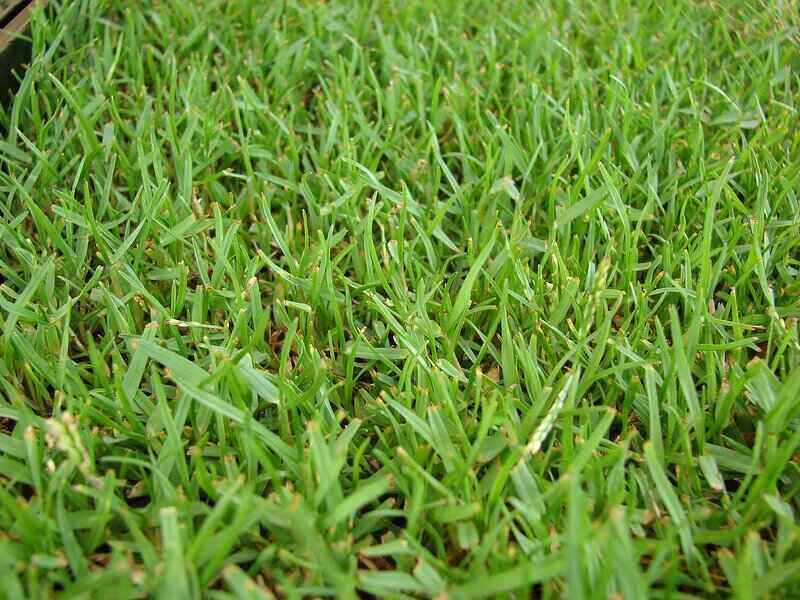
Photo Credit: Forest and Kim Starr / Wikimedia Commons / CC BY 3.0 US
If you’re looking for a grass with excellent drought and heat resistance, Zoysiagrass is the one for you. Native to parts of Asia, this warm-season grass is growing in popularity in Tennessee yards. It may grow slowly, but it’s worth the wait.
Zoysiagrass grows best in full sun, and although some varieties have much better shade tolerance than that of Bermudagrass, it can still lose some of its density in medium to heavy shade. It’s also low maintenance and requires less nitrogen fertilizer than other warm-season grasses and minimal irrigation.
With the right soil pH, phosphorus, potassium, and micronutrients, a Zoysiagrass lawn can certainly be the envy of the neighborhood.
- Classification: Warm-season grass
- Spreads by: Stolons and rhizomes
- Shade tolerance: Moderate
- Drought tolerance: Moderate to High
- Foot traffic tolerance: High, but recovers slowly from damage
- Maintenance needs: Low nitrogen fertilization requirements but prone to thatch build-up
- Mowing height: Set mowing height between 1 and 2 inches.
- Potential for disease: Good disease tolerance overall
- Soil pH: 6.0-6.5
- Soil type: Well-draining; some cultivars more tolerant of a wide range of soils than others
Grass Plug and Seed Options:
– Zoysia Plugs (50 Large Grass Plugs)
– Zoysia Plugs (50 Full & Lush Grass Plugs)
– Zoysia Plugs (100 Plugs)
– Zenith Zoysia Grass Seeds (1/8 lb. of seeds)
5. Perennial Ryegrass
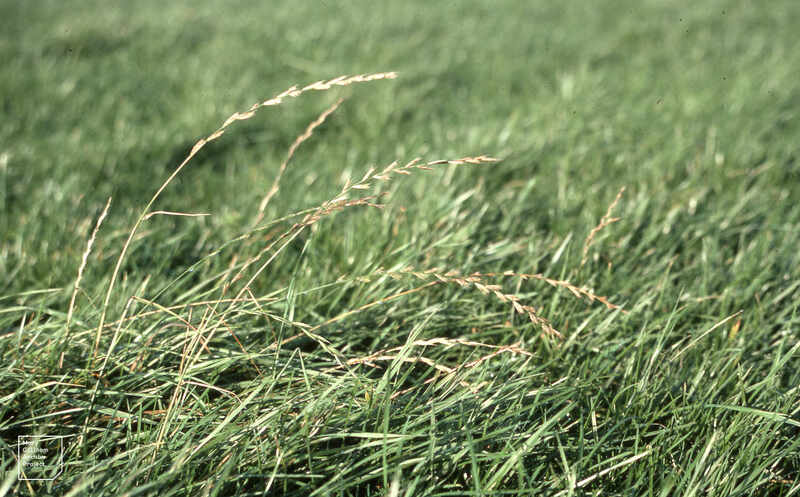
Photo Credit: Dr Mary Gillham Archive Project / Flickr / CC BY 2.0
Although it’s not meant to be a permanent turf, perennial or English ryegrass is a popular cool-season species for Tennessee. It’s fast-growing, so it can handle a lot of wear and still look great.
It also tolerates mowing at shorter heights and recuperates quickly from reduced maintenance schedules, so it’s a great low-maintenance choice. Plus, it can outcompete weeds with its fibrous leaves and forms a mat-like tapestry of growth.
The downside to ryegrass is that it’s cold-sensitive, meaning it won’t fare well in the brisk Tennessee winter months, so it’s not an ideal choice as a permanent lawn – but it can do well mixed with other grass seeds or as an overseeding solution.
- Classification: Cool-season grass
- Spreads by: Has a bunch-type growth habit
- Shade tolerance: Low
- Drought tolerance: Low
- Foot traffic tolerance: High
- Maintenance needs: Moderate mowing and fertilization requirements. Thatch is not significant.
- Mowing height: Set mowing height to 1.5 to 2.5 inches
- Potential for disease: High. Common diseases include gray leaf spot, red thread, and leaf spot/melting-out.
- Soil pH: Can grow in soils with a pH between 5 and 8, but prefers between 6 and 7.
- Soil type: Prefers good drainage and fertility but can tolerate some poor drainage.
Grass Seed Options:
– Outsidepride Perennial Ryegrass Seed (5 lbs.)
– Eretz ProTurf Perennial Ryegrass Fine Lawn Seed (choose your size)
How to Choose the Best Grass Seed for Your Tennessee Lawn
Hunting for your perfect grass seed begins with understanding the needs of your lawn. To create your ideal turf, ask yourself the following questions:
How Much Sunlight and Shade Does Your Yard Get?
- Best grasses for little to no shade: Perennial ryegrass, Bermudagrass
- Best grasses for moderate shade: Tall fescue, Zoysiagrass
How Much Time and Effort Do You Want to Spend on Your Lawn?
- Low maintenance requirements: Tall fescue, perennial ryegrass
- High maintenance requirements: Kentucky bluegrass, Bermudagrass
If you consider these questions when shopping for grass seed, you can find the perfect Tennessee grass type for your yard’s natural conditions and your preferred lawn maintenance schedule.
Best Grass Seed by Region
The state’s three distinct geographic regions – East, Middle, and West Tennessee – all have their own weather patterns and preferred grass types.
Sure, there are a few “universal” grass types that work well all over the state, but to really get the perfect lawn for your home, you’ll need to consider what type of grass is best suited for your specific area.
Check out these city-specific grass type guides:
- Best Grass Types in Nashville, TN
- Best Grass Types for Chattanooga, TN
- The Best Grass Types for Memphis, TN
Don’t live in these cities? Read on for more general regional advice.
East Tennessee
East Tennessee’s climate ranges from the hot and humid days of midsummer to brisk, cool winter months.
The best type of grass for this region is tall fescue. It’s hardy and well-suited to varying climatic conditions, and it quickly establishes from seed – making it an ideal choice for maintaining a lush green lawn year-round.
Plus, taller varieties can support heavier foot traffic and are more resistant to disease than the other popular cool-season choice, Kentucky bluegrass.
Middle Tennessee
Feel the heat in Middle Tennessee? Bermudagrass is your best bet. A warm-season grass with good drought tolerance and heat resistance, this robust turf needs plenty of sun to thrive and requires frequent maintenance but makes up for it with good repairability.
The best grass seed for Middle Tennessee would involve a blend of Bermuda with some form of annual ryegrass for overseeding during the winter.
West Tennessee
What works in West Tennessee? Kentucky bluegrass takes the cake, as it does well even in low-fertility soils. While it’s a bit more high-maintenance by nature than some other grass types, its shallow roots allow for quick germination and can provide a real bang for your buck.
Plus, it’s tolerant of most diseases when it’s properly maintained and can even withstand frosty winter days – perfect for the westernmost regions of the Volunteer State.
FAQ About The Best Grass Seed for Tennessee
With proper preparation and management, seeding a lawn can cost anywhere from $680 and $1,815, depending on the size of your yard and the grass type you’re planting. If you’re unsure of which species to pick, it’s a good idea to consult a local lawn care professional for guidance.
The most common type of grass in Tennessee is tall fescue. This cool-season grass is known for its shade and drought tolerance as well as its low maintenance needs.
Perennial ryegrass is the fastest-growing grass seed available in Tennessee. This cool-season grass establishes quickly and grows fast, making it a great choice for overseeding lawns.
Bermudagrass is the best grass for full sun in Tennessee. This warm-season grass takes some maintenance to keep it looking great, but the lush and green results are worth it.
Some of our top lawn care tips for Tennessee include:
• Test your soil
• Make sure your watering schedule is efficient and doesn’t produce waste
• Aerate the lawn to loosen compacted soil
• Leave grass clippings on the lawn after mowing
• Keep an eye out for symptoms of pests and disease so you can nip problems in the bud
That depends on your grass type. For planting info on the grass types listed in this article, see our article on the best time to plant grass seed in Tennessee.
A Lush Lawn, Tennessee-Style
Tennessee lawns can be tricky to keep looking great all year round. But with the right grass type for your needs and Tennessee’s climate, you can still have a thick and lush lawn you’ll be proud of.
Tennessee isn’t called the Volunteer State for nothing. Whether you live in Knoxville, Memphis, Chattanooga, Nashville, or classic small-town Tennessee, there is a lawn care service out there that can help you plant and maintain the perfect grass for your lawn.
LawnStarter can connect you with professional and affordable lawn care services in your area, so you can have a healthy and beautiful lawn in no time.
LawnStarter participates in the Amazon Services LLC Associates Program, an affiliate advertising program. LawnStarter may earn revenue from products promoted in this article.
Main Image Credit: Archarin / Wikimedia Commons / CC BY 3.0